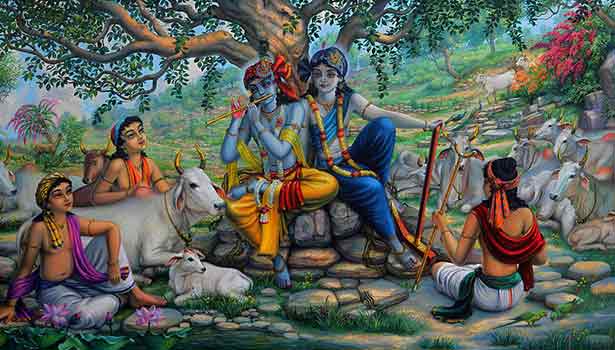CHAPTER LXIV
(THEIR DEPARTURE FOR VRINDAVANA)
VAISHAMPAYANA said: - Seeing the number of those irrepressible wolves, daily increased, all the men and women living in that village held a consultation amongst themselves (1):"It is not proper for us to live any more in this forest. Let us go to another great forest where we may live happily and the kine may range of their own accord (2). Even today without any delay we will depart with our precious kine, before these dreadful wolves destroy the entire Vraja (3). These black-faced wolves, with twany-coloured limbs, teeth and nails, set up a terrible roar in the night (4). "My son, my brother, my calf, my cow have been eaten by the wolves." Such cries are heard in every house" (5). Hearing the cries of the milk-women and the doleful noise of the kine, the assembled cow-herds wished to transfer, without any delay, their station. Being informed of their desire to go to Vrindāvana for fixing their station elsewhere for the well-being of the kine and finding them resolute in this matter, Nanda, like the preceptor of the gods, gave vent to the following weighty accents (6-8):-" If you are resolved upon going away even this very day, then ask the inhabitants of Vraja to get themselves ready without any delay" (9).
Thereupon the menials announced in the village, saying "this station will be transferred to Vrindāvana. Therefore collect your own cows and calves, get ready your carts and place your own vessels thereon" (10-11). Hearing those well-meaning words of Nanda they all rose up for going away speedily (12). Then there was set up a tumult of "come; let us go: what is the delay? Make your carts ready. Rise up. Go" (13). With busy cowherds and milk-women, with their innumerable carts ready that village assumed the appearance of a roaring ocean (14). The milk-women, with jars on their heads, and being arranged in rows, like stars coming out of the sky, issued out of Vraja (15). Having their breasts covered with blue, yellow, and shinning jackets, those milk-women, while going on the road, appeared like a rain-bow (16). Carrying the load of ropes hanging on their body some milk-men imitated the beauty of trees cover on with branches and leaves (17). The shinning carts moving all around, that village of cowherds appeared like an ocean abounding in boats upset by the wind (18). Thus divested of all articles in no time and filled with crows it appeared like a desert (19).
Thereupon having gradually arrived at the forest of Vrindāvana, they, for the well-being of the kine, set up many extensive stations there (20). With roads laid out for carts and situate like a crescent that forest was one Yoyana in breadth and two in circumference (21). It was protected on all sides with thorny creepers and trees, ditches and flying branches (22). It was beautified with charming posts and rods, with jars full of water for washing, stakes tied round with ropes and nooses, with upraised pillars, overturned carts, chords thrown upon the pillars of vessels, grass for covering the huts, sheds made of grass, with branches of trees, playing hither and thither and trees abounding in nests, cleansed cow-sheds, well-placed mortars, the burning fire placed in the west, and well stretched beds consisting of clothes and leather coatings (23-27). Bringing water and removing the branches of the trees the milk-women began to cleanse the forest (28). Youthful and old milk-men with axes, began lightly to fell down the trees (29). This station of the milk-men, abounding in woods, charming habitations, sweet roots, fruits and water, appeared more beautiful (30). While ranging in the forest before, Krishna, with a delighted heart, looked at that forest for the well-being of the kine. And so obtaining that forest of Vrindāvana, filled with the nests of various birds and resembling the garden of Nandana, all the cows, giving milk whenever milched, were highly pleased (31-32). In the last month of the dreadful summer season, the king of gods used to pour there nectarine showers. And accordingly the people there did not suffer from any disease and all the vegetables grew in profusion. The calves and ignorant people do not suffer any disease or meet with destruction where the Lord Madhusudana lives himself for the behoof of mankind (33-34).
In this way the youthful Sangkarshana, the milk-men and the cows began to live there where Krishna thought of fixing the station (35).
Source: https://archive.org/details/AProseEnglishTranslationOfHarivamsh
| Previous | | Source | | Tamil Translation | | Next |
